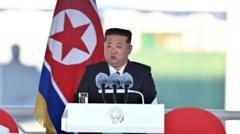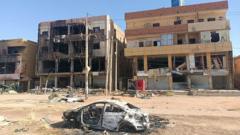The U.S. government has revealed plans to impose sanctions on Sudan's military due to their alleged employment of chemical weapons in the ongoing civil war, which has already claimed tens of thousands of lives and displaced millions.
U.S. Sanctions Sudan for Chemical Weapons Use Amid Ongoing Civil Conflict

U.S. Sanctions Sudan for Chemical Weapons Use Amid Ongoing Civil Conflict
The State Department announces new sanctions against Sudan’s military government over its reported use of chemical weapons.
Following a decision by the U.S. State Department, the United States is set to apply new sanctions on Sudan’s military-led government in light of evidence indicating the military’s use of chemical weapons last year. The State Department's announcement, made public on Thursday, offered limited information about the specifics of the weapons' deployment or their locations, mentioning only that Congress had been informed of a violation of the Chemical Weapons Convention.
In a January report, The New York Times flagged that Sudan’s military had utilized chemical weapons—specifically chlorine gas—on at least two occasions against the Rapid Support Forces (R.S.F.), a significant paramilitary faction engaged in a fierce struggle for dominance in the nation. Concerns had arisen regarding the potential for chemical weaponry to be deployed within Khartoum, the capital, at that time caught in a stalemate between opposing military factions.
The sanctions are anticipated to take effect on June 6, a timeline that Sudan’s military government has yet to officially respond to, despite their longstanding denials of employing chemical weapons. Recently, the military designated Kamel Idris, a former UN official, as the new prime minister—a move some observers see as an attempt to bolster its international legitimacy.
Public sentiment within Sudan appears skeptical regarding the claims of chemical weapon use, as local media have largely remained silent on the issue. American officials have explained that the deployment of such weapons was limited in scope and occurred in remote areas, thereby lacking effectiveness and news coverage.
The chemical weapon allegations add another troubling chapter to an already devastating civil conflict in Sudan, which ignited in April 2023, resulting in tens of thousands of deaths and the forced displacement of approximately 13 million individuals, while also exacerbating a dire humanitarian crisis.
Both conflicting parties have faced accusations of war crimes, yet only the R.S.F. has been specifically labeled a perpetrator of genocide by U.S. authorities—prompting sanctions against its leader, Lt. Gen. Mohamed Hamdan, in January. A week thereafter, further sanctions targeted Sudan’s army chief, Gen. Abdel Fattah al-Burhan, with private revelations suggesting his approval of chemical weapon usage.
With the introduction of the new sanctions, the United States aims to restrict Sudan’s exports and government loan access, reiterating its commitment to holding accountable those engaged in the proliferation of chemical weapons and calling for an immediate cessation of their use.
In a January report, The New York Times flagged that Sudan’s military had utilized chemical weapons—specifically chlorine gas—on at least two occasions against the Rapid Support Forces (R.S.F.), a significant paramilitary faction engaged in a fierce struggle for dominance in the nation. Concerns had arisen regarding the potential for chemical weaponry to be deployed within Khartoum, the capital, at that time caught in a stalemate between opposing military factions.
The sanctions are anticipated to take effect on June 6, a timeline that Sudan’s military government has yet to officially respond to, despite their longstanding denials of employing chemical weapons. Recently, the military designated Kamel Idris, a former UN official, as the new prime minister—a move some observers see as an attempt to bolster its international legitimacy.
Public sentiment within Sudan appears skeptical regarding the claims of chemical weapon use, as local media have largely remained silent on the issue. American officials have explained that the deployment of such weapons was limited in scope and occurred in remote areas, thereby lacking effectiveness and news coverage.
The chemical weapon allegations add another troubling chapter to an already devastating civil conflict in Sudan, which ignited in April 2023, resulting in tens of thousands of deaths and the forced displacement of approximately 13 million individuals, while also exacerbating a dire humanitarian crisis.
Both conflicting parties have faced accusations of war crimes, yet only the R.S.F. has been specifically labeled a perpetrator of genocide by U.S. authorities—prompting sanctions against its leader, Lt. Gen. Mohamed Hamdan, in January. A week thereafter, further sanctions targeted Sudan’s army chief, Gen. Abdel Fattah al-Burhan, with private revelations suggesting his approval of chemical weapon usage.
With the introduction of the new sanctions, the United States aims to restrict Sudan’s exports and government loan access, reiterating its commitment to holding accountable those engaged in the proliferation of chemical weapons and calling for an immediate cessation of their use.



















